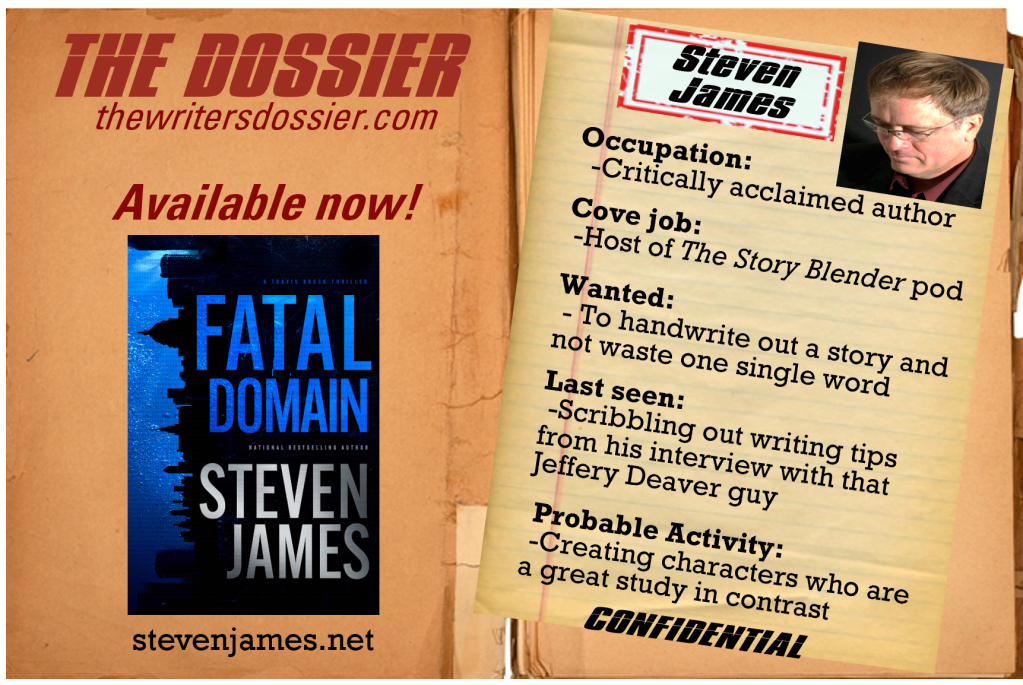Steven James
Fatal Domain

DOSSIER: The Story Blender Podcast you host—where great storytellers share the secrets to great story telling—is packed with great insights that’s really helpful to aspiring authors. Despite that you’ve written nearly twenty novels, what’s an episode that stands out for something that you actually learned from one of your guests?

JAMES: Ha! I often find myself taking notes from the guests. There are always different insights and approaches. One that pops to mind is Jeffery Deaver’s interview a number of years ago. We have diametrically opposed approaches, since he is a proponent of outlining and I’m a totally organic writer. Still, I really respect him as an author and love that he has found success in his approach. I learned how outliners think and that’s helpful for me to keep in mind.
DOSSIER: In the tradition of how you end your podcast by getting great information from your guests, the Dossier is going to turn the tables on you. First, what’s one novel that’s not yours, that everyone should read before they die? And finally, even though your books have sold over one million copies, what’s one thing that would you tell your younger self?
JAMES: So, you have listened to my podcast… Well, let’s see. I’d say that first book that comes to mind was a book I read when I was starting off as an author. It’s the the National Book Award-winning novel The Book of the Dun Cow. It taught me the importance of every word in your writing. I don’t think there’s an extra word anywhere in the story. As far as advice for my younger self, I would say, “Stop feeling like you need to prove yourself to anyone. You have worth even though you don’t feel like it at times. If other people don’t acknowledge it, that’s their problem, not yours.”
The following questions are from Steven James fan John Davis, Oklahoma City, OK
DAVIS: I recommend the novels I enjoy to my young adult daughters. As I read and listened to yours, I noticed they have very little if any profanity, which is distinctly different from many, if not most novels out there. Was this a conscious decision by you, and if so, what drove that decision?

JAMES: It actually is a conscious decision. I’ve heard from many readers that they don’t want profanity in their books and so, as a way to serve and respect my readers, I avoid it. Also, I think it’s an easy out for authors, to just have people cuss and curse all the time. I like characters who exhibit a bit more self-control and in many instances these expressions make me think less of the character (because of their lack of self-restraint) rather than more. So, to each his own, but I prefer books without a lot of unnecessary profanity.
DAVIS: Patrick Bowers is a complicated man, and his step-daughter, Tessa, is equally complicated. It seems that it’s a history lesson in honesty and earning trust. How did you create the special tension-filled dynamic between those two characters?
JAMES: Interestingly enough, when I started writing my first novel she was just a grumbly teenage girl who wasn’t all that fascinating. It wasn’t until I started to give voice to the thoughts that I sensed she would think, the words, the actions, and so on, that she began to emerge as a very complex and interesting character. I like studies in contrast: she listens to death metal and sleeps with a Teddy Bear. She is intellectual acute but emotionally wounded. That’s interesting to me and what fascinates me tends to come through in my stories.
Also, I like that they are striving to still get to know each other, as she did not grow up with him as a father-figure in her life. So, they are on this constant arc of understanding. I try to let them each be themselves and the more I do that honestly, the more their stories and personalities really emerge.

DAVIS: Your books highlight an aspect of investigation centering around geo-spatial processes and the intersection of those in finding killers. How did you discover this and then develop the process for your novels?
JAMES: When I was working on my first novel I wanted something that was a little unique and at the time, everyone else in the police procedural realm in fiction and on television was doing profiling and forensics (most still do). So, I stumbled across this article on geospatial investigation and reached out to researcher who originated it and consulted with him. It’s still a fascinating approach to me and I love that Bowers is unique in utilizing it.
DAVIS: Patrick Bowers seems to be on a spiritual journey instigated by the death of his wife. Does his journey of existential angst and spiritual curiosity in any way mirror your own journey in such matters?

JAMES: I am naturally very curious and like to ask questions that matter—big questions about life and meaning and God and truth. I love that Bowers approaches things always believing that the truth matters: “Truth is not afraid of scurrility.” I like that. So, I try to press big questions against the fabric of my stories and allow characters to ask questions about hope, truth, justice, free will, forgiveness, and so on. And, in each book, I find myself growing in the realms of better understanding myself, my beliefs, and my place in the world. We’re not on precisely the same pathway, but we are on similar ones.
Website: Steven James | Amazon Page